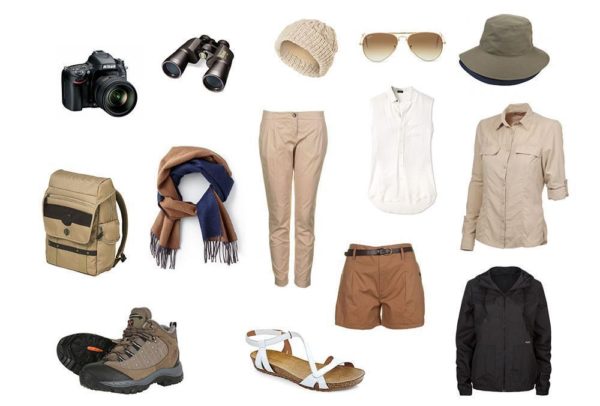Recommended Tanzania Safari Packing List for Tourist
Baggage and Sleeping (not applicable to lodge safaris):
– Elasticated water-proof rucksack cover (only if incorporating a multi-day walking safari)
– Large Holdall, to contain everything you’ll need while on wildlife safari
– Daysack, 25-35 liters, for personal use while on wildlife safari; for ready-access items
– Sleeping Bag, rated to -10C if climbing Kili with Kilibound Adventures, or +5C if on safari only
– Water-proof rucksack liner or heavy duty plastic sack (only if incorporating a multi-day walking safari) such as Lake Natroni tour and Lake Eyasi tours
– Sleeping bags are available on rent
– Daysack, 25-35 liters, for personal use while on wildlife safari; for ready-access items
Clothing:
– Jacket and trousers, (for active safaris that incorporate hunting or trekking),
– Sweat-wicking T-shirts / vests – Fleece.
– Lightweight walking trousers (for active safaris that incorporate hunting or trekking, avoid jeans or heavy cotton as they chafe and dry slowly)
– Underwear (briefs are usually better than boxer shorts which gather and chafe)
– Very good quality hiking socks and thin liner socks. (We advise that socks should be at least a size too small otherwise they stretch and bunch causing blisters)
– Breathable lightweight waterproofs
– Balaclava, (for ascents of Kili or Oldonyo Lengai only) – Wide brimmed sun hat to protect face, ears and neck
– Jacket and trousers, (for active safaris that incorporate hunting or trekking),
– Waterproof walking boots, sturdy and worn-in, (if your safari incorporates active elements and walking)
Hygiene:
– Sanitary products
– Toothbrush, toothpaste & deodorant
–Flat packed Wet Ones, travel wipes, or similar for personal hygiene on the mountain.
– Kleenex tissues in plastic travel pouches or toilet paper
– Hairbrush / comb
– Sanitary products
– Lip salve with UV protection
– Vaseline, to prevent chafing skin and heel friction blisters
Health:
– Malaria tablets (if you choose to take these. Most will seek advice from their GP. Note: some anti-malarial courses need to commence several weeks before departure.
– Sun cream. Note: some argue that most sun creams are carcinogenic and either organic sun barriers or loose fitting clothes that cover the skin are regarded by many as preferable.
Documents:
– Passport (with additional 6 months’ validity after proposed trip return date)
– Tanzanian Entry Visa. (If flying to Nairobi and taking the bus to Arusha, Kenyan visas can be bought on arrival at Nairobi airport.)
– Air Travel Documents – Cash in US dollars in denominations of $10 and $20 (tipping allowance and local purchases, taxis, meals, etc)
– Credit Cards (recommended for eventualities only & obtaining extra cash from ATMs)
– Travel Insurance Documents
– Vaccination Certificates (where applicable) – Traveler’s Cheques are not recommend as they are subject to extremely poor conversion rates in Arusha.
Other stuff:
– Camera and film or Digital Camera and spare memory cards & batteries & charger
– Sunglasses with UV-filter lenses
– High energy snacks (Cereal bars, dried fruit and nuts)
– Spare Contact Lenses and fluid, if worn – Watch
– Head torch with spare batteries
– Water bottles & Camelbak (3 litres carrying capacity if climbing)
– Water Purification Tablets / Iodine drops
– Ear Plugs (in the event of attempting to sleep near barking dogs)
– Plastic bags (for dirty washing, used wrappers, etc.)
– Telescopic walking poles (optional – and for use on active safaris & climbs only)
– Mobile phone. There is signal reception in much of the national parks and safari areas. Note: It is a very good idea to unlock your phone before you come out so that a local SIM card can be used. This will make calls home very inexpensive.
Personal Small First Aid Kit:
– Pain Killers (Ibuprofen)
– Diamox (Acetazolamide) if you are climbing Kilimanjaro – Paracetamol
– Zinc oxide tape and small scissors.
– Compeed Blister Pads
– Immodium / Loperamide anti-diarrhea tablets
– Any medication you normally use
– Dioralyte sachets or similar re-hydration packs. Note that your guide or safari liaison will carry a more comprehensive medical kit containing additional Acetazolamide, Ibuprofen, Anti-inflammatory gel, bandages, Loperamide, Amoxycilin, Oral Dexamethasone, and several other items.Kilibound highly recommend these Tanzania Safari Packing List for all tourist and travel who wish to visit Tanzania.

